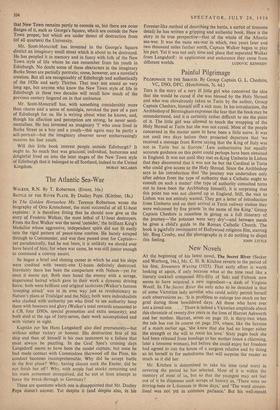The Atlantic Sea-War
WALKER, R.N. By T. Robertson. (Evans, 16s.) BATTLE OF THE RIVER PLATE. By Dudley Pope. (Kimber, 18s.) IN The Golden Horseshoe Mr. Terence Robertson wrote the biography of Otto Kretschmer, the most successful of all U-boat captains: it is therefore fitting that he should now give us the story of Frederic Walker, the most lethal of U-boat destroyers. From the first Walker was the naval 'outsider,' the brilliant King's Medallist whose aggressive, independent spirit did not fit easily into the rigid pattern of peace-time routine. He barely scraped through to Commander, and was then passed over for Captain— yet paradoxically, had he not been, it is unlikely we should ever have heard of him; for when war came, he was still junior enough to command a convoy escort.
So began a brief and shining career in which he and his ships were credited with twenty-one U-boats definitely destroyed. Inevitably there has been the comparison with Nelson—yet for once it seems apt. Both men hated the enemy with a savage, impersonal hatred which gave to their work a dynamic driving force; both were brilliant and original tacticians (Walker's famous 'creeping attack' was in its own way just as revolutionary as Nelson's plans at Trafalgar and the Nile); both were individualists who clashed with authority yet who lived to see authority heap them with honours and glory (Walker's total rewards amounted to a CB, four DSOs, special promotion and extra seniority); and both died at the age of forty-seven, their work accomplished and with victory in sight.
Kapitan zur See Hans Langsdorff also died prematurely—but without either victory or honour. His destruction first of his ship and then of himself is his own testament to a failure that must always be puzzling. In the Graf Spee's cruising days Langsdorff seems to have been the model captain; but once he had made contact with Commodore Harwood off the Plate, his conduct becomes incomprehensible. Why did he accept battle in the first place? Why, having almost sunk the Exeter, did he not finish her off? Why, with ample fuel stocks remaining and his main armament unimpaired, did he not at least attempt to force the break-through to Germany?
These are questions which one is disappointed that Mr. Dudley Pope doesn't answer. Yet despite it (and despite also, in his Forester-like method of describing the battle, a surfeit of tiresome detail) he has written a gripping and authentic book. Here is the story in its true perspective—that of the whole of the 'Atlantic sea-war. It was the same sea-war in which, two years later and two thousand miles farther north, Captain Walker began to play his part. Yet it was not only time and place that separated Walker from Langsdorff: in application and endurance they came from


















































 Previous page
Previous page